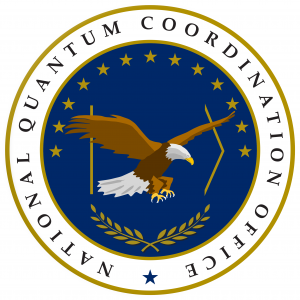How are quantum computers actually hosted or connected to the cloud? Today, we have a ... perhaps we can
also show the development roadmap in that regard -
which also shows a bit holistically how we integrate the hardware, the software, and also then the building the applications and we need to connect, of course, the quantum computer which is sitting here to classical computers and through these classical computers in the cloud you actually have the access. So that's why you can connect with your mobile phone or with your classical computer to the cloud and can access our quantum computers. But of course there's a lot of things behind which may go a bit too much into detail to explain here, but we are because you run certain circuits and you run algorithms and we are continuously developing that the architecture which is actually has been announced today. So, this is really brand new. This is an announcement of today which you see which is a holistic and integrated picture of the full stack development which we do from the hardware to the software and also the applications part and providing then also the service through the cloud. Because we talked a bit about what do you need to know in order to use quantum computers and of course in the end we want to have like a frictionless development and frictionless use of people using quantum computers. This means if you are in chemistry and your job is to design new drugs then you should kind of use the software and the tools which are used today but behind the scene quantum computers are used in order to solve the problems. But you should not need to learn kind of special things in order to use them in the most efficient way.
Quantum Computing Lectures: The Future
-
"We are analog beings living in a digital world, facing a quantum future."
-- Neil Turok
"Quantum computing is already with us in limited form. But the next five to 10 years may see it leap into the mainstream in the same way that classical computers moved from labs and large corporations to businesses of all sizes, as well as homes, in the 1970s and 1980s."
References:
- Deloitte Predicts Accelerated Quantum Adoption in 2023:
https://www.quantumbusinessnews.com/applications/deloitte-predicts-accelerated-quantum-adoption-in-2023
"IBM's CEO thinks in 2025 we will see the first applications of quantum computing - commercial advantage. The industry and the governments agree that quantum computing is closer than we think and will revolutionize everything: from climate change to electric batteries to how diamonds are obtained."
- Communication Networks
- Chemistry
- beyond the reach of classical computers
- Quantum Technologies
- born cloud native
- Blockchain
- needs public encryption - RSS / ECC standards
- chose the two protocols that Quantum can break!
- Steal Now / Decrypt Later
- New alloys / New Materials / Clean Tech
- Fleet Management
- Sustainability
- climate change
- climate change
- Think about Data-Driven Computing
- Memory Driven
- Moving Data is the "Friction"
- Reverse the order of computing
- 6G - Around 2030 - Digital Twin of Everything
- need 1000 times faster
- distributed computing
- Quantum Sensors
- need better diagnostic devices
- navigation around the world
Commercial Advantage in 2025?
IBM’s roadmap for building an open quantum software ecosystem
https://www.ibm.com/blogs/research/2021/02/quantum-development-roadmap/
How are quantum computers actually hosted or connected to the cloud?
The development roadmap shows a bit holistically how we integrate the hardware, the software, and also then building the applications. This is an announcement which you see which is a holistic and integrated picture of the full stack development which we do from the hardware, to the software, and also the applications part and providing the service through the cloud.
Because we talked a bit about what do you need to know in order to use quantum computers and of course in the end we want to have like a frictionless development and frictionless use of people using quantum computers.
Where are we today with quantum computers?
Today it's really exciting as we have increased the number of qubits, we increased the quality of the measurements, and the control of the qubits. We have also designed and engineered the system to be more robust and stable to kind of improve really all the different parameters.
At the end of last year in September, we have announced the roadmap which we are pursuing. In this roadmap, you can see the different quantum processors, and last year we have demonstrated 'hummingbird'. It has 65 cubits. We are now on a path to increase the number of qubits continuously. So this year, we will demonstrate a 127 qubit chip which is 'eagle' and as you can imagine for each of those steps, we have significant technical improvements which are implemented in these different generations. In 2022, we show a 443 qubit chip and then it's really getting very exciting because we will break the 1,000 qubit barrier in our 'condor' chip. Again technological improvements are required for this. This will allow the world to solve more complex problems.
Where are we today with quantum computers, then? Today it's really exciting as I mentioned we have increased the number of qubits, we increased the quality of the measurements, and the control of the qubits. We have also
designed and engineered the system to be more robust and stable to kind of improve really all the different parameters. Just at the end of last year in September, we have also announced the roadmap which we are pursuing. In this roadmap, you actually see the different processors, the different quantum processors, and last year we have demonstrated the so-called 'hummingbird'. It has 65 cubits. We are now on a path to really increase the number of qubits continuously. So this year, we will demonstrate a 127 qubit chip which is 'eagle' and as you can imagine for each of those steps, we have significant technical improvements which are implemented in these different generations. In 2022, we show a 443 qubit chip and then it's really getting very exciting because we kind of break the 1,000 qubit barrier and reach more than 1,000 cubits in our 'condor' chip. Again technological improvements are required for this. We are working on them and this demonstration really is then a demonstration of above thousand qubits and it will allow us and also the world of course more complex problems to be solved. This is integrated also with a whole infrastructure right because it's not only about the hardware there is also the infrastructure around the software, how to control, how to write software, developing applications, etc. So there are lots of things which are going concurrently.
Where are we today with quantum computers?
Human beings face big problems. In fact, our biggest problems are so big we often don't even recognize them as problems. We see them as impossible obstacles that we learn to avoid, not tackle. We need to feed increasing numbers of people, change the way we use natural resources, better manage volatile global economies, and counter emergent viruses.
- ultimate objective is to make quantum useful
- make development as frictionless as possible
- simple cloud-based services
- need control circuits
- pre-build runtimes tuned to the problem set
https://www.youtube.com/watch?v=0ka20qanWzI
Welcome to quantum.gov! the home of the National Quantum Initiative and ongoing activities to explore and promote Quantum Information Science.
Biden National Cyber Strategy Seeks to Hold Software Firms Liable for Insecurity
https://www.wsj.com/articles/biden-national-cyber-strategy-seeks-to-hold-software-firms-liable-for-insecurity-67c592d6

